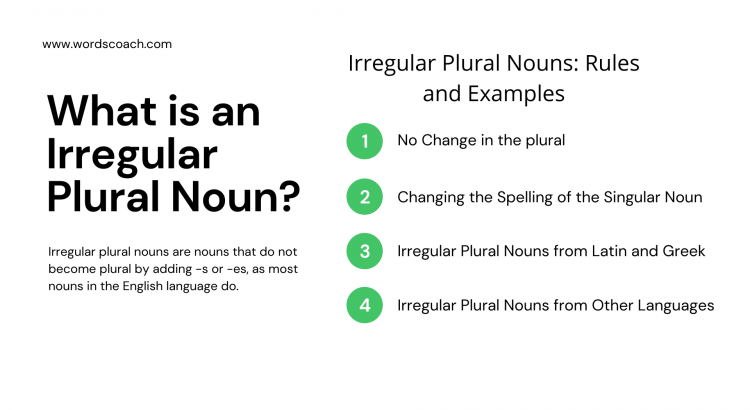Irregular plural nouns are nouns that do not become plural by adding -s or -es, as most nouns in the English language do.
For example, the plural form of man is men, not mans. The plural form of woman is women, not womans. There are hundreds of irregular plural nouns, and in truth, you must memorize them through reading and speaking.
Examples of irregular nouns in singular and plural format:
| Singular | Plural |
| Mouse | Mice |
| Foot | Feet |
| Child | Children |
| Woman | Women |
| Person | People |
| Man | Men |
| Goose | Geese |
Learn the difference between plural and singular nouns; and different ways to form Irregular Plural Nouns in English.
Irregular Plural Nouns: Rules and Examples
1. No Change in the plural
Some nouns have similar singular and plural. Many of those are the names of animals.
Irregular Plural Nouns Example:
- Fish – fish
- Deer – deer
- Moose – moose
- Series – series
- Sheep – sheep
- Trout – trout
- Swine – swine
- Offspring – offspring
- Means – means
- Species – species
- Hovercraft – hovercraft
- Spacecraft – spacecraft
- Aircraft – aircraft
- Barracks – barracks
- Gallows – gallows
- Salmon – salmon
2. Changing the Spelling of the Singular Noun
The plural is usually formed by simply changing the vowel of the singular.
Irregular Plural Nouns Example:
- Child – children
- Man – men
- Woman – women
- Person – people
- Policeman – policemen
- Foot – feet
- Tooth – teeth
- Goose – geese
- Mouse – mice
- Penny – pence
- Louse – lice
- Ox – oxen
3. Irregular Plural Nouns from Latin and Greek
- Final a becomes -ae, or just adds -s
Example :
1. Formula – formulae/formulas
2. Alumna – alumnae - Final ex or ix becomes -ices
Example:
1. Vertex – vertices
2. Matrix – matrices
3. Appendix – appendices
4. Index – indices /indexes - Final is becomes es
Example:
1. Testis – testes
2. Axis – axes
3. Genesis – geneses
4. Nemesis – nemeses
5. Crisis – crises - Final um becomes -a, or just adds -s
Example:
1. Medium – media/ mediums
2. Spectrum – spectra
3. Forum – fora/forums
4. Corrigendum – corrigenda
5. Ovum – ova
6. Datum – data - Final us becomes -i or -era or -ora or just adds -es
Example:
1. Alumnus – alumni
2. Focus – foci
3. Corpus – corpora
4. Campus – campuses
5. Syllabus – syllabi/syllabuses
6. Virus – viruses/virii
7. Octopus – octopuses
8. Fungus – fungi - Final us remains unchanged in the plural
Example:
1. Status – status/statuses
2. Meatus – meatus/meatuses - Final on becomes -a
Example:
1. Phenomenon – phenomena
2. Criterion – criteria
3. Automaton – automata
4. Polyhedron – polyhedra - Final as in one case changes to -antes
Example:
1. Atlas – Atlantes (statues of the Titan)
2. Atlas – atlases (map collections) - Final ma in nouns of Greek origin can become -mata
Example:
1. Schema – schemata/schemas
2. Anathema – anathemata/anathemas
3. Stigma – stigmata/stigmas
4. Stoma – stomata/stomas
5. Lemma – lemmata/lemmas
4. Irregular Plural Nouns from Other Languages
- Some nouns of French origin add an -x:
1. Beau – beaux/beaus
2. Tableau – tableaux/tableaus - Nouns of Slavic origin add -a or -i according to native rules, or just -s:
1. Kobzar – kobzari/kobzars
2. Oblast – oblasti/oblasts - Nouns of Hebrew origin add -im or -ot according to native rules, or just -s:
1. Seraph – seraphim/seraphs
2. Kibbutz – kibbutzim/kibbutzes
3. Matzah – matzot/matzahs - Many nouns of Japanese origin have no plural form and do not change:
1. Otaku – otaku
2. Samurai – samurai
3. Benshi – benshi - Nouns from languages other than the above generally form plurals as if they were native English words:
1. Pizza – pizzas
2. Kangaroo – kangaroos
3. Canoe – canoes
4. Ninja – ninjas
Sentence Examples:
- There are several varieties of grass.
- The ancient people had a few types of styles of dress.
- There are many different styles of hair.
- There are several varieties of grass.

